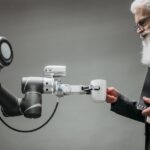Artificial Intelligence (AI) has evolved from a futuristic concept into a practical tool that is reshaping industries, economies, and daily life. Among the most exciting developments in this field are AI agents—autonomous, intelligent systems designed to perform tasks, make decisions, and interact with humans or other systems.
In the workplace, AI agents are proving to be game-changers, enhancing productivity, streamlining operations, and unlocking new opportunities for innovation. This article explores how AI agents are transforming workplaces, their key applications, and real-world examples of their impact, all while remaining accessible to a broad audience.
What Are AI Agents?
At their core, AI agents are software programs or systems powered by artificial intelligence that can act independently to achieve specific goals. Unlike traditional software, which follows rigid, pre-programmed instructions, AI agents use machine learning, natural language processing, and data analysis to adapt, learn, and respond to changing conditions. Think of them as digital assistants with a brain—capable of understanding context, solving problems, and even anticipating needs.
In a workplace setting, AI agents can take many forms: virtual assistants that schedule meetings, chatbots that handle customer inquiries, or sophisticated systems that optimize supply chains. Their ability to process vast amounts of data, perform repetitive tasks, and provide actionable insights makes them invaluable across industries, from healthcare to manufacturing to retail.
The Promise of AI Agents in the Workplace
The integration of AI agents into workplaces offers several transformative benefits. These include increased efficiency, cost savings, improved decision-making, and enhanced employee experiences. Let’s break these down!
Boosting Efficiency and Productivity
AI agents excel at automating repetitive, time-consuming tasks, freeing employees to focus on higher-value work. For instance, data entry, scheduling, and basic customer support can be handled by AI, reducing human workload and minimizing errors. This efficiency doesn’t just save time—it allows businesses to scale operations without proportionally increasing staff.
Reducing Costs
By automating routine processes, AI agents can lower operational expenses. Companies no longer need to hire additional personnel for tasks that AI can handle, and the technology often works around the clock without the need for breaks or overtime pay.
Enhancing Decision-Making
AI agents can analyze massive datasets in seconds, providing insights that humans might miss. Whether it’s predicting market trends, identifying inefficiencies, or flagging risks, these agents empower leaders to make informed, data-driven decisions quickly.
Improving Employee and Customer Experiences
AI agents can personalize interactions, whether it’s tailoring training programs for employees or responding to customer needs in real time. This creates a more engaged workforce and happier clients, fostering loyalty and growth.
Key Applications of AI Agents in Workplaces
To understand how AI agents are revolutionizing workplaces, let’s explore some of their most impactful applications.
1. Administrative Support
Administrative tasks like scheduling meetings, managing emails, and organizing files can consume hours of an employee’s day. AI agents, such as virtual assistants, streamline these processes. For example, tools like Microsoft’s Cortana or Google Assistant can automatically schedule meetings based on participants’ availability, send reminders, and even draft responses to routine emails. This allows workers to focus on creative or strategic priorities rather than logistical details.
Example: A mid-sized marketing firm adopts an AI agent to manage its team’s calendars. The agent not only schedules client calls but also predicts peak workload periods, suggesting optimal times for brainstorming sessions. As a result, the team reports a 20% increase in productive hours.
2. Customer Service and Support
AI-powered chatbots are perhaps the most visible example of AI agents in action. These systems can handle customer inquiries 24/7, answering questions, troubleshooting issues, and escalating complex cases to human agents. Unlike earlier chatbots that relied on scripted responses, modern AI agents use natural language processing to understand and respond to nuanced queries.
Example: A global e-commerce company implements an AI chatbot to manage its customer service. The agent resolves 80% of inquiries—like tracking orders or processing returns—without human intervention. Customer satisfaction rises due to faster response times, and the support team shifts its focus to handling high-value, personalized interactions.
3. Data Analysis and Insights
In data-driven industries, AI agents are indispensable for turning raw information into actionable strategies. They can sift through financial reports, customer feedback, or operational metrics to identify patterns and recommend improvements. This capability is especially valuable in sectors like finance, healthcare, and logistics.
Example: A hospital uses an AI agent to analyze patient records and predict staffing needs. By identifying trends—such as seasonal spikes in flu cases—the agent helps administrators allocate nurses and doctors more effectively, reducing wait times and improving care quality.
4. Supply Chain Optimization
For businesses that rely on complex supply chains, AI agents can monitor inventory, predict demand, and optimize logistics. These systems reduce waste, prevent stockouts, and ensure timely deliveries, all while adapting to real-time disruptions like weather delays or supplier issues.
Example: A manufacturing company deploys an AI agent to oversee its supply chain. When a key supplier faces a delay, the agent reroutes shipments from an alternative source and adjusts production schedules automatically. Downtime drops by 15%, saving the company millions annually.
5. Training and Onboarding
AI agents can personalize employee training by assessing individual skill levels and learning styles. They can deliver interactive tutorials, track progress, and suggest additional resources, making onboarding faster and more effective.
Example: A tech startup uses an AI agent to onboard new developers. The agent evaluates their coding skills, assigns tailored exercises, and provides real-time feedback. New hires reach full productivity 30% faster than with traditional training methods.
Real-World Examples of AI Agents at Work
To illustrate the transformative power of AI agents, let’s look at a few companies leading the charge.
Amazon: The retail giant uses AI agents in its warehouses to manage inventory and optimize picking routes for workers. These agents, paired with robotics, have slashed delivery times and made Amazon a leader in logistics efficiency. Beyond operations, Amazon’s Alexa serves as an AI agent for customer-facing tasks, answering queries and processing orders.
Salesforce: This customer relationship management (CRM) platform integrates AI agents through its Einstein tool. Einstein analyzes sales data, predicts customer behavior, and suggests next steps for sales teams, helping businesses close deals faster and improve client relationships.
Siemens: In manufacturing, Siemens employs AI agents to monitor equipment health. These agents predict when machines are likely to fail, scheduling maintenance before breakdowns occur. This proactive approach has reduced downtime and extended the lifespan of costly machinery.
Challenges and Considerations
While AI agents offer immense potential, their adoption isn’t without challenges. Businesses must address several factors to ensure success.
Workforce Adaptation
Employees may fear job displacement or struggle to adapt to new tools. Companies can mitigate this by offering training and emphasizing that AI agents are partners, not replacements, designed to enhance human capabilities.
Data Privacy and Security
AI agents rely on data to function, raising concerns about how that data is stored and used. Organizations must implement robust security measures and comply with regulations like GDPR to protect sensitive information.
Initial Investment
Deploying AI agents requires upfront costs for software, hardware, and integration. However, the long-term savings and productivity gains often outweigh these expenses, making it a worthwhile investment for many firms.
The Future of AI Agents in Workplaces
Looking ahead, AI agents are poised to become even more integral to workplaces. Advances in generative AI, like the technology powering tools such as ChatGPT, suggest that future agents will be capable of creative tasks—writing reports, designing prototypes, or even brainstorming ideas alongside humans. As they grow smarter, AI agents may evolve into collaborative teammates, seamlessly blending into workflows.
Imagine a future where an AI agent not only schedules your meetings but also prepares agendas based on past discussions, anticipates project roadblocks, and suggests solutions before you ask. Or picture a factory where AI agents coordinate with human workers in real time, adjusting production based on live market demand. These scenarios are not far off—many are already in development.





